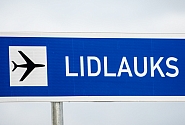
To prevent passengers from being defrauded when unscrupulous taxi providers charge exorbitant fares, a maximum fare will be introduced for taxi journeys from the airport or other transport infrastructure sites of international importance as well as the option of pre-payment. The Saeima approved these amendments to the Law on Carriage by Road in the third and final reading on Wednesday, 27 March.
Pre-payment of the journey will be possible online or in person at the airport. In order to operate in the special airport zone, the carrier must provide the customer with the possibility to pay for the journey in the taxi with a pre-purchased voucher. The maximum fare will also apply to any taxi operating from the airport. The fare caps and zones of operation, as well as the maximum additional charge per journey will be set by the Cabinet of Ministers.
Information on the issue or cancellation of a licence card will be published by the planning region or the local government of the city on the e-services platform of the Road Traffic Safety Directorate. If the carrier does not have the car for which the licence has been issued for more than three months, the licence will be cancelled.
During a meeting of the Economic, Agricultural, Environmental and Regional Policy Committee, responsible for overseeing the progress of the draft law in the Saeima, MPs emphasised the critical need for oversight to uphold the order and quality of taxi services on airport premises. Addressing questions from MPs, the Ministry of Transport underscored that the proposed amendments would provide the airport with enhanced control measures to regulate taxi operations within its territory, ensuring compliance with regulations such as the prohibition on touting taxi services in the territory of the airport. Additionally, the amendments aim to foster closer collaboration between municipal authorities to bolster regulatory oversight.
The amendments impose restrictions on the use of vehicles for commercial passenger transport that have been prohibited by the State Revenue Service (SRS). Every year, the SRS will furnish the Road Transport Administration with information on the employment figures of licensed passenger transport companies for the preceding year.
As of 1 January 2027, taxi services are only to be provided using vehicles first registered no later than 1 January 2009, i.e. no older than 18 years.
The amendments additionally introduce a new approach to calculating carbon dioxide emissions for cars registered after 31 December 2020. It stipulates setting emission thresholds at 180 grams per kilometre for vehicles with up to seven seats and 240 grams per kilometre for those with more than seven seats, aimed at incentivising the use of greener vehicles.
From now on, transportation of goods beyond Latvia's borders can be conducted by individuals starting from the age of 18, possessing a category C or CE driving license with the entry Code 95. Similarly, individuals starting from the age of 18 will now be eligible to obtain a D1 license (for buses with seating capacity not exceeding 16 and not surpassing eight meters in length) and a D1E license. Currently, individuals are required to be at least 21 years old to obtain these licenses.
The amendments also include administrative liability for violations related to goods cabotage and tachograph usage, failure to submit or incomplete submission of the driver's posting declaration, and for listing non-compliant carriers, drivers, or vehicles on websites or mobile applications.
Skaidrīte Ābrama, Chair of the Economic, Agricultural, Environmental and Regional Policy Committee, highlighted that by early April next year, the Ministry of Transport needs to present the Committee with an evaluation of the efficacy of the uniform tariff and vouchers and the oversight system in enhancing the quality of taxi services at Riga Airport. Additionally, the Committee has called for an evaluation of the reasoning behind different requirements for commercial passenger transport via taxi versus private vehicles. The Ministry has also been tasked with determining the feasibility of implementing a unified licensing system within the taxi sector and to formulate strategies for curbing the shadow economy.
Saeima Press Service







